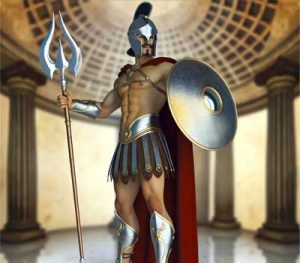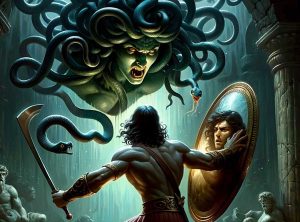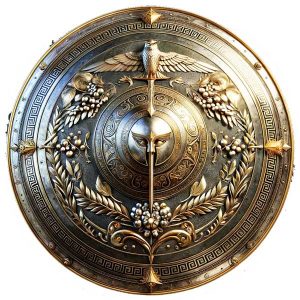The Legendary Hero of Greek Mythology

Perseus was the son of Zeus, the king of the gods, and Danaë, the princess of Argos. His birth came about through a prophecy and divine intervention. Danaë’s father, King Acrisius of Argos, had been forewarned by an oracle that his grandson would kill him. To prevent this, he locked Danaë away in a bronze chamber or a tower to keep her away from men.
However, Zeus came to her in the form of golden rain, penetrating the chamber and impregnating her with Perseus.
When Acrisius discovered Danaë’s child, he cast them both into the sea in a wooden chest, fearing to kill them directly because of divine retribution. The chest washed ashore on the island of Seriphos, where Dictys, a fisherman and the brother of King Polydectes of Seriphos, found and took care of them.
The Quest to Slay Medusa

The adventure begins with Perseus, the son of Zeus and the mortal Danaë, finding himself in a perilous situation orchestrated by King Polydectes of Seriphus, who desired Danaë and sought to rid himself of her protective son.
Polydectes deceitfully claimed he intended to marry another and required from each suitor a gift; unable to provide a suitable gift, Perseus rashly vowed to fetch anything the king wished for, leading Polydectes to demand the head of Medusa, one of the three Gorgon sisters whose gaze turned onlookers to stone.
The Gifts of the Gods to Perseus
Understanding the impossibility of the task for a mere mortal, the gods intervened to assist Perseus. Athena, the goddess of wisdom and warfare, gifted him a polished shield, advising him to use its reflective surface to avoid Medusa’s petrifying gaze directly.

Without these divine gifts, Perseus’ mission would have been infinitely more challenging, if not impossible. The intervention of the gods highlights their support for mortal heroes facing insurmountable odds.
The significance of these gifts goes beyond mere tools; they symbolize guidance, protection, and empowerment from higher powers. They signify that even in times of great peril, help can come from unexpected sources to aid us on our journey towards victory.
Perseus’ reliance on these gifts underscores the belief that sometimes we need external aid to overcome seemingly unbeatable obstacles in life’s trials and tribulations.
The Three Graiai
Before confronting Medusa, Perseus needed to locate her, a task requiring the knowledge of the Graiai, three witch-like sisters who shared one eye and one tooth among them. They were the keepers of the Gorgons’ secret. By stealth and cunning, Perseus seized their shared eye as they were passing it amongst themselves, compelling them to reveal Medusa’s whereabouts by withholding their vision until they complied.
The Slaying of Medusa
Guided by the Graiai’s directions, Perseus reached the Gorgons’ lair while they slept. Medusa, unlike her immortal sisters Stheno and Euryale, was vulnerable to mortal attacks. Using the mirrored shield as his guide, Perseus approached Medusa without making direct eye contact, struck swiftly, and decapitated her. From Medusa’s severed neck sprang Pegasus, the winged horse, and Chrysaor, a warrior, both fathered by Poseidon.
The Return Journey and Use of Medusa’s Head
With Medusa’s head safely stored in a bag, Perseus embarked on his return journey. The head’s power to turn to stone remained potent, a fact Perseus used to his advantage. On his way back, he rescued Andromeda from a sea monster by using Medusa’s head to petrify the beast, later taking her as his wife.
Upon his return to Seriphus, Perseus confronted King Polydectes, who had mistreated Danaë in his absence. Unveiling Medusa’s head, Perseus turned Polydectes and his court to stone, liberating his mother and fulfilling his vow. He then gifted the head to Athena, who placed it on her shield, the Aegis, as a powerful protective symbol.
The quest of Perseus highlights themes of heroism, cleverness, and the importance of divine assistance in overcoming seemingly insurmountable challenges. The inclusion of mythical elements such as the Graiai, Pegasus, and the magical artifacts underscores the rich tapestry of Greek mythology, where gods and heroes intersect to shape the destinies of both mortals and the divine. Perseus’s legacy endures as a testament to courage, ingenuity, and the triumph of good over evil.
Further Adventures and Legacy
After slaying Medusa, Perseus used her head as a weapon on several occasions before giving it to Athena, who placed it on her shield, the Aegis. On his journey back to Seriphos, Perseus saved Andromeda from a sea monster and took her as his wife. Upon his return, he turned Polydectes and his followers to stone to protect his mother.
Perseus eventually fulfilled the prophecy that he would kill his grandfather, Acrisius, albeit accidentally, during an athletic competition. After his adventures, Perseus returned to Argos but, feeling remorse for the death of Acrisius, traded kingdoms with Megapenthes, becoming king of Tiryns and founding Mycenae.
Perseus is celebrated not only for his heroic deeds but also for his role in founding several cities and for his lineage, which includes many famous figures in Greek mythology. His descendants include Heracles (Hercules in Roman mythology), making him an ancestor of many other mythological heroes.
Characteristics and Symbolism
Perseus embodies the archetypal hero in Greek mythology, marked by his courage, virtuous character, and the favor of the gods. His story touches on themes of prophecy, the complexity of fate, and the intervention of the divine in human affairs. Unlike other heroes who often have tragic flaws, Perseus is notable for his moral integrity and the successful completion of his quests without succumbing to hubris or tragic downfalls.
His legacy includes not just his heroic deeds but also the cultural and religious impacts of his adventures. The myth of Perseus and Medusa, for example, has been interpreted in various ways over the centuries, including as an allegory for overcoming the monstrous and chaotic elements of nature and human psyche.
Modern Day References and Adaptations of Perseus’ Story
His epic tale of bravery and triumph against all odds has inspired numerous adaptations across various forms of media.
From blockbuster movies like “Clash of the Titans” to popular TV series like “Percy Jackson,” Perseus’ story has been reimagined time and again for contemporary audiences. These adaptations often infuse new elements while staying true to the core themes of courage, perseverance, and divine intervention.
In literature, graphic novels, and video games alike, Perseus remains a timeless figure whose journey resonates with people from all walks of life. Whether portrayed as a traditional hero or given a modern twist, his character serves as a symbol of hope and resilience in the face of adversity.
The enduring popularity of Perseus’ story speaks to its universal appeal and relevance across cultures. As we continue to reinterpret his legend for today’s audience, we are reminded that the essence of his quest – overcoming challenges through strength and ingenuity – is a narrative that transcends time itself.
Why the Tale
Perseus’ story is a captivating tale that has endured through centuries, captivating audiences with its themes of bravery, perseverance, and the power of divine intervention. From his humble beginnings as the son of Zeus and Danaë to his epic quest to slay Medusa and rescue Princess Andromeda, Perseus exemplifies the hero’s journey in Greek mythology.
The challenges he faced along the way – from defeating monsters like Medusa and the sea serpent Cetus to outsmarting King Polydectes – showcase his cunning and resourcefulness. The gifts he received from the gods – such as Hades’ helmet of invisibility, Hermes’ winged sandals, and Athena’s mirrored shield – were instrumental in his success.
Lessons abound in Perseus’ story: about courage in the face of adversity, about using one’s wits to overcome obstacles, and about how even those with humble beginnings can rise to greatness. Modern adaptations like movies (such as Clash of the Titans) or video games continue to draw inspiration from this timeless myth.
In essence, Perseus’ tale reminds us that we all have our own battles to fight and quests to undertake. It encourages us to embrace our inner strengths, seek help when needed, and never lose sight of our goals. So next time you face a daunting challenge or feel overwhelmed by circumstances beyond your control, remember Perseus’ journey – for within it lies the blueprint for triumph against all odds.
